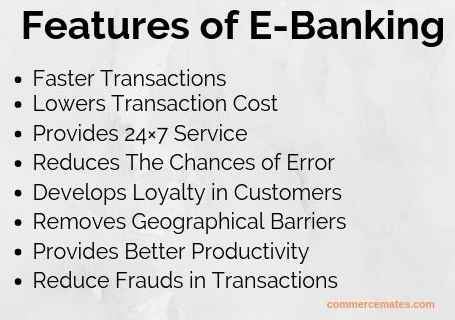Contents
Meaning of E-Banking
E-banking refers to the process of using banking services online over the internet. It is a technique through which customers avail all services of banks through the internet. It is also termed as internet banking, electronic banking & virtual banking.
Customers are easily able to access their accounts & perform various financial transactions just by using their phones & laptops. It is all possible because of e-banking. It saves the time of customers & provides 24×7 service.
Customers can use their banking services any time & from anywhere through the e-banking feature. E-banking service all operate through the transmission of electronic signals between customer device & website of their banks.
E-banking services are of different types like Telebanking, smart cards, ATMs, E-cheques & debit cards. Customers are able to secure their account & protect them from frauds using e-banking service.
They can easily monitor their account continuously. It also reduces the workload & operation cost of banking organisations. E-banking has also reduced the chances of human errors as there is no possibility of errors occurring in a fully automated system.
Features and Characteristics of E-Banking
The important features of E-banking are as follows:

Faster Transactions
E-banking provides the facility of instant transfer of funds to its customers. It saves the time of customers as funds get transferred very fast from one account to another. Whole system of E-banking is automated & works over the internet.
People don’t need to wait in queue to transfer their funds or pay off their bills; they can easily do it through their device. It saves the time of customers as they can easily access their account with the help of their device.
Lowers Transaction Cost
E-Banking reduces the cost involved in doing financial transactions. Electronic transactions are termed as the cheapest medium of doing transactions. It has reduced the manpower requirements as workload is reduced.
Whole transactions are done online over the internet. It has also reduced the paperwork in organisations as all transactions are recorded digitally. There is no need to manually enter & store each record.
Provides 24×7 Service
This is the most important feature of E-banking. E-Banking provides customers with all-time access facility to their accounts. Customers can easily access their account anytime & from anywhere with no limitations. It provides convenience to the customers as they can perform transactions as per their wish.
Reduces The Chances of Error
E-banking has reduced the chance of human error. It has reduced the role of the human in the whole transaction process. E-banking system works fully automated over the internet. All transactions are recorded & stored digitally. There is no need to manually maintain each & every record in books of account. So, the chances of human error are minimised.
Develops Loyalty in Customers
E-banking helps the banks to develop large number of loyal customers. Through E-banking service banks are able to serve their customers well. They are able to provide fast & better service to customers.
Customers are able to get a user-friendly interface from the banking website. They are able to avail services any time even from their home comfort. This develops a sense of loyalty among customers when they are happy with the services of their banks.
Removes Geographical Barriers
E-Banking has removed all distance barriers for performing transactions. It has removed all distance barriers that customers used to face in the traditional method of performing transactions.
E-banking provides the facility of instant transfer of funds both nationally & internationally. All systems are connected to each other online which facilitate easy transfer of funds.
Provides Better Productivity
It has an efficient role in increasing the productivity of the businesses. Whole financial transaction system is supported by automated software systems. These systems are specially designed for doing transactions of funds.
It reduces the time required for doing transactions & also reduces the workload of business organisations. Everything is stored digitally & they don’t need to store anything manually. It increases the overall productivity of the businesses.
Reduce Frauds in Transactions
Another important feature of e-banking is that it helps in continuously monitoring of accounts. You can easily track each & every transaction of your accounts. You can easily track if any fraud is done by anyone in financial transactions.
It provides a complete digital footprint of all those who can modify your banking activities & commit fraud. It thereby adds transparency to your accounts which reduces the overall chances of fraud.